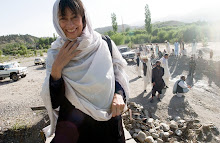Jan Mohammad Khan zat er zelfverzekerd bij toen ik hem in 2007 opzocht in zijn ommuurde huis in Tarin Kowt. De ex-gouverneur over wie het gerucht ging dat hij niet kon lezen of schrijven, lachte smalend om de Nederlanders met al hun high tech even verderop in Kamp Holland. Ze hadden hem opzij gezet, maar als peetvader, adviseur en stamgenoot van president Karzai maakte hij nog altijd de dienst uit. Als sterke man in het gebied kon hij bovendien bij de Amerikaanse troepen heel wat potjes breken.
Na verloop van tijd kreeg JMK de nodige rivalen in de slangenkuil van Uruzgan, maar mede dankzij zijn oude band met president Karzai bleef hij het levende voorbeeld dat ook het zogenaamde nieuwe Afghanistan via persoonlijke connecties met warlords annex maffiosi in plaats van via instituten werd bestuurd.
Net als bij de aanslag op Karzais broer een week geleden is het nog onduidelijk wie de moord op JMK op zijn geweten heeft, al claimt de Taliban ook deze daad. Maar wel staat vast dat de president weer een steunpilaar minder heeft in het even cruciale als weerbarstige zuiden.
Thomas Ruttig van de denktank Afghanistan Analysts Network: "The biggest thing is the psychological impact on Karzai losing two people very close to him and to the family. In a system here that is very patronage-based, that he is not able to protect his closest allies will have consequences. People will hedge their bets, in case the Taliban come back one day. They will make deals so they can survive that. With the first western soldiers leaving there is an atmosphere of concern and fear. People sending their sons out of the country to study or giving money so smugglers can take them abroad … they don't trust that the institutions are sustainable enough to survive."
skip to main |
skip to sidebar
JOURNALISTIEK DIE DE TIJD NEEMT Over Afghanistan, Birma, Irak, Syrie en andere oorden waar geleefd wordt in oorlog en dictatuur. En over het vak. https://www.zijspreekt.nl/actueel/nieuws/in-beeld/Journalistiek-die-de-tijd-neemt-Minka-Nijhuis-InBeeld-bij-ZijSpreekt/369/4/1/
